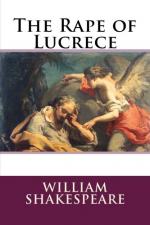|
This section contains 8,064 words (approx. 27 pages at 300 words per page) |

|
SOURCE: Camino, Mercedes Maroto. “‘That Map which Deep Impression Bears’: The Politics of Conquest in Shakespeare's Lucrece.” In Shakespeare: World Views, edited by Heather Kerr, Robin Eaden, and Madge Mitton, pp. 124-45. Cranbury, N.J.: Associated University Presses, 1996.
In the following excerpt, Camino draws parallels between The Rape of Lucrece, Renaissance practices of mapmaking, and colonial conquest. The critic contends that the poem can be viewed as an expression of the “imperial ‘achievement’ of patriarchy” that resulted in the sublimation of both colonized populations and women in general.
When Lear placed the map before him, he was aware that his signs would effect an irreversible division of his kingdom. With this gesture he fragmented not only his state but also his psychic integrity. As the Fool notes, Lear's partition turned the world upside down:
When thou clovest thy crown i'th'middle, and gav'st away both parts, thou bor'st thine...
|
This section contains 8,064 words (approx. 27 pages at 300 words per page) |

|


